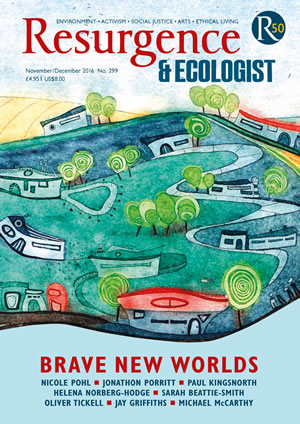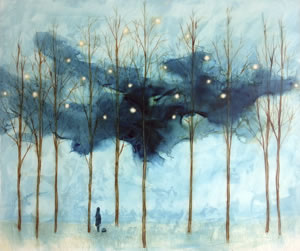I went mad once. I like being able to say that unabashedly. It happened a few years ago when I was at a crisis point of manic depression. I am on good terms with that episode now because of what it gave me: there was meaning in that madness which I had to find. For in spite of the agony (and abetted by the ecstasy), this period revealed to me a profound truth of the mind’s relationship with metaphor and with poetry’s enigmatic invocations.
Poets, writers and artists (and indeed those who ought to be artists but do not or cannot follow the calling) are disproportionately affected by manic depression as if we are familiar visitors to the psyche’s other world, beyond the literal. In my severest moments, I was reality’s orphan, alive to poetry or dream, dwelling in the realms of metaphor.
At the beginning of this madness, my main metaphor was ocean, as I felt I was at the shoreline before the tsunami; later, I felt like a broken boat in sea surges of storm, surrounded by waves which would wreck me. Over and over again, I felt I was drowning. In a brief and brilliant moment, my realm was starlight; I felt I was flying in the flickering world of deep space. For months, though, my realm was mountains. The edge. The abyss. The death zone at the peak.
I did not use metaphor as a decorative device of Eng. Lit. classes but rather as the expression of my situation, which was far truer (if not more actual) than mere reality. Poetry and reality swapped densities: poetry mattered more than the unsure real. Metaphor had more significance because the poetic way of thinking is a vital part of the psyche which is incomplete when it only works literally.
The distressed psyche is in an irreal state mirrored in poetry’s beautiful irreality, which is why so many people turn to reading poetry in those states. I felt safe reading poetry and I felt contained and understood by it because its comprehensive rendering of the psyche comprehended me. In offering echoes of my mind, the metaphoric gaze stood witness to the truths within me, perhaps like the vital role of the parental gaze to witness, comprehend and contain the distress of an infant.
Metaphor matters in madness. Matters so much that you could say metaphor is the material of madness, the mothering tongue of the madstruck mind, mater of it all. I could feel the metaphoric weight of things in my mind, heavy as a mountain. More importantly, metaphors alone could bear the weight which my mind, heavy with intensity, placed on them. Metaphor was strong enough. Reality wasn’t. Reality weighed so lightly on me that the actuality of the entire Cambrian mountain range was a skittering colt in frantic canter. Significance shifted. Gravity, weight and import were all located in the metaphorical world.
I usually write prose, but in that episode I wrote poetry compulsively; awake at night, I was a poacher in paradise, searching in the fields of madness for the jawbones of the gods. Orpheus, of course, was singing in the grasses. It is as if madness splits the psyche open so it can reach its own kind of ‘Dreamtime’ where the mythic world surrounds the moment, where metaphor deepens the present into an eternity of significance, of the divine, of insight. The future and the past do not seem to be ahead or behind the present, but rather they surround the present with the heft of all time, all at once, as if the horizontal axis of time was overtaken by a sense of the staggering momentousness of the moment, right now.
If a literal sentence runs horizontally across the page, with each word meaning just one thing, and inviting the attention to move across quickly, then metaphoric language works vertically; it pauses long on just one word and drops down into its charged cargo of significance.
I prefer to use the term manic depression, a term filled with colour and character, rather than the digital term bipolar, which is chillsome, reduced and clinical, because I want to use language which is filled with meaning, rather than emptied of it. Words reflect realities of the mind, and people in a crisis of mania or depression seem to stubbornly stick to precise metaphors which tell their truth at any one time; hence the writer Andrew Solomon’s profound work titled The Noonday Demon or the poet Gérard Nerval seeing depression as a black sun, while Les Murray, Winston Churchill and others describe it as a ‘black dog’. Some say they are in an ‘abyss’ or a ‘black hole’. For the person in crisis, these images are carrying a burden of significance which listeners, be they doctors, psychiatrists or friends, need to appreciate. In madness, to speak of an ocean, for example, is an attempt to give the listener that sense of deep and multiple meanings, and to do so, sometimes, repetitively, as if the rhythm of repetition can hold the import of the word.
Meta-phor, in its etymology, means a carrying-across of attributes from one thing to another, and the metaphor one uses carries meaning across to the listener; it bears a message from someone who may be lost and urgently needing to be found. If the listener can stay within the terrain of the exact metaphor the speaker uses, the speaker will feel less lost, more reachable. In Don Quixote, the delusional Quixote is treated by the doctor (Cervantes himself) who aims to stop Quixote’s madness by working within his lunacy, curing him through the very terms he uses. As did Gerard Manley Hopkins, I experienced the mountains of the psyche and I felt that I was climbing in the death zone while the cliffs of fall were all around me. I wanted my friends and my doctor to know ‘where’ I was, although I only intermittently wanted to be rescued.
The metaphors people use in depression and manic depression are frequently drawn from the natural world, and I think this is because Nature is so open to meanings, so generous with connotations and symbolism. So a river can represent time passing, or cleansing; the sun can suggest strength or glory; the moon, musing or melancholy; a feather can suggest thought or message; and a tree can carry the significance of endurance or truth. (Both ‘endurance’ and ‘truth’ are, to my utter delight, related to the word ‘tree’.) The sense of time which inheres in the natural world is also healing for the mind, because although the natural world always speaks itself in the fullness of the present moment, it also fills out that present into the past and the future, the cycles of growth or decay both implicit and (often) visual.
Metaphors of the natural world open into wider meanings, offering connotations which befriend the psyche. Other metaphors, the distraught mind pictured as a broken computer, for example, do not open up but rather close down meaning into more denotative language. It is as if the troubled mind finds more depth and texture when it can use analogy to express its truths rather than convert itself into one-dimensional expression.
In the months of crisis, I felt close to the mythic world. Orpheus arrives when the disturbed mind needs him, because he was both healer and poet, while the music he played on his lyre was said to vanquish melancholy. The legends say that when Orpheus was savaged and slaughtered – ripped to pieces by the shrieking, jealous maenads – he did not so much die as become dispersed in the natural world, so that everything in Nature echoes his deep song, and his lyre can still be heard now, softening sadness, gentling despair.
The mind in madness leans closer to myth, to metaphor and poetry. This stance of the mind hears the echo rather than the literal melody. A way of hearing which listens to the music of streams playing in sympathy with Orpheus’ lyre. This is a way of seeing aligned to the shadow rather than to the object which casts it.
For the literal world has a metaphoric penumbra of imaginative significance, and this is where the world glows; the halo of events which both poetry and madness understand. For nothing is only real: it is real and ideal; the psyche’s metaphoric idea of something is always the augmented version, greater and grander, as if the metaphorical vision capitalised the heart of things, the Mountain of the mountain, the Moon of the moon, the Midnight of midnight, seeing the quintessence of its nature, ethereal and enduring.
The other world. The uncertain world. The peripheral vision. Metaphor is like the ‘sympathetic string’ on an instrument, which, unplayed, resounds in sympathetic resonance to the playing of the main string, most strongly at either the same tone or an octave interval. The main string actually played is not as important as the sympathetic string, which sings its negative capability in a resonance of gold.







